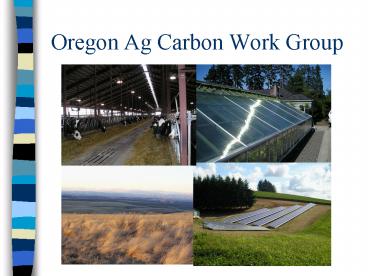Oregon Ag Carbon Work Group - PowerPoint PPT Presentation
1 / 19
Title:
Oregon Ag Carbon Work Group
Description:
Ag likely won't be regulated under a greenhouse gas reduction program ... in other words, payments for each type of service provided by the producer ... – PowerPoint PPT presentation
Number of Views:53
Avg rating:3.0/5.0
Title: Oregon Ag Carbon Work Group
1
Oregon Ag Carbon Work Group
2
Introduction
- Agriculture represents a small percentage of
greenhouse gas emissions - Ag likely wont be regulated under a greenhouse
gas reduction program - Voluntary agricultural practices can help reduce
greenhouse gas emissions and sequester carbon
3
Ag Carbon Work Group
- Evaluated opportunities for agricultural offsets
- Focused on voluntary sequestration/GHG reduction
projects - Ag groups, environmental groups, agencies, offset
experts participated
4
Offsets Overview
- Reduction, removal or avoidance of emissions that
compensates for emissions elsewhere - Available for non-regulated sectors
- Used by regulated sectors to help comply with
caps in cap-and-trade program
5
Key offset criteria
- Additional - what will be eligibility date?
- Real
- Quantifiable - baseline vs. project reductions
- Outside of capped sectors
- Permanent
6
Key questions
- What types of practices will be eligible for
offsets? - How to reward early adopters
- What potential do various practices in Oregon
have to reduce emissions? - What prices are necessary to encourage these
practices?
7
GHGs evaluated
- Carbon dioxide
- Methane
- Nitrous oxide
8
GHG Mitigation
- Soil sequestration practices
- Nutrient management
- Irrigation water management
- Manure management
- Livestock diet management
9
Soil Sequestration
- Reduced tillage
- Crop rotation
- Pasture/range management
- Some data for east side
- Less data for west side
- Per-ton incentives will probably be fairly low
for E Oregon (although lots of other benefits
from sequestered C)
10
Nitrous oxide reductions
- Application rates/timing
- Precision application
- Controlled-release products
- Irrigation water management
- Several research needs identified
11
Livestock diet management
- Animal selection/breeding
- Improve feed digestibility
- Additives to reduce methane production
- Little to no net economic benefit from practices
so incentives would help encourage them - Need more research to be able to quantify benefits
12
Manure management
- Minimize anaerobic conditions - aerate manure in
lagoons - Avoid long storage periods
- Avoid application to saturated soils
- Anaerobic digesters
13
Energy projects
- Most energy efficiency and renewable energy
projects will not be eligible for offsets in the
long-term. - Benefits of these projects will be claimed at the
utility level. - However, there are other incentives available for
these types of projects.
14
Some conclusions of group
- Good practices for offsets in Oregon
- Digesters - benefits are really easy to quantify
- Soil sequestration practices are eligible for
some programs already - Problems with offsets for other practices
- Need to reward early adopters
- Not enough data to quantify the benefits of many
practices in Oregon at this time - Payment amounts for some practices wont be
enough to encourage them
15
Conclusions
- We know there are GHG reduction and carbon
sequestration benefits from many practices, but
just arent able to quantify them - It makes sense to offer incentives for these
practices - just not necessarily offsets - Farm Bill seems to be an appropriate mechanism
- Many FOTG practices already providing benefits
16
Conclusions
- Reward ecosystem services that producers are
providing, including erosion control, water
quality protection, wildlife habitat, GHG
reduction, and carbon sequestration - Allow stackable incentives - in other words,
payments for each type of service provided by the
producer
17
Conclusions
- Need more research to help quantify benefits of a
variety of practices - Also need technical assistance resources to
assist producers with GHG reduction and carbon
sequestration practices - Many GHG benefits described in FOTG - describe
benefits for all practices that reduce GHGs and
sequester carbon
18
Conclusions
- Marketing can be another important benefit of
documenting GHG reductions and carbon
sequestration - both developing new markets and
keeping existing markets
19
Next steps
- Add a column about magnitude of effects to the
Climate Friendly FOTG practice list - Identify systems of practices and compare
benefits to other systems































